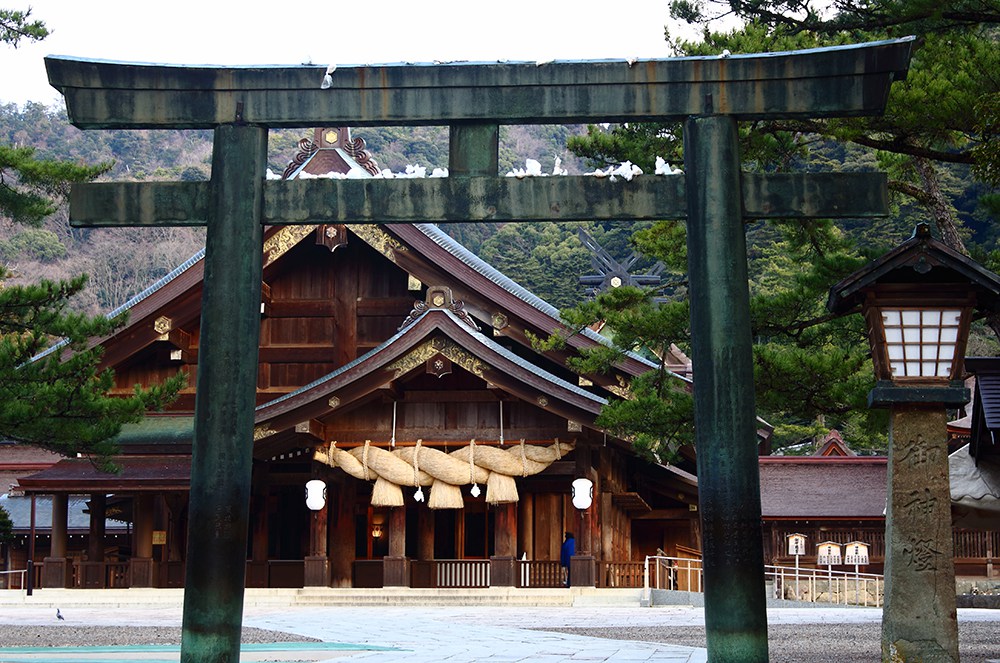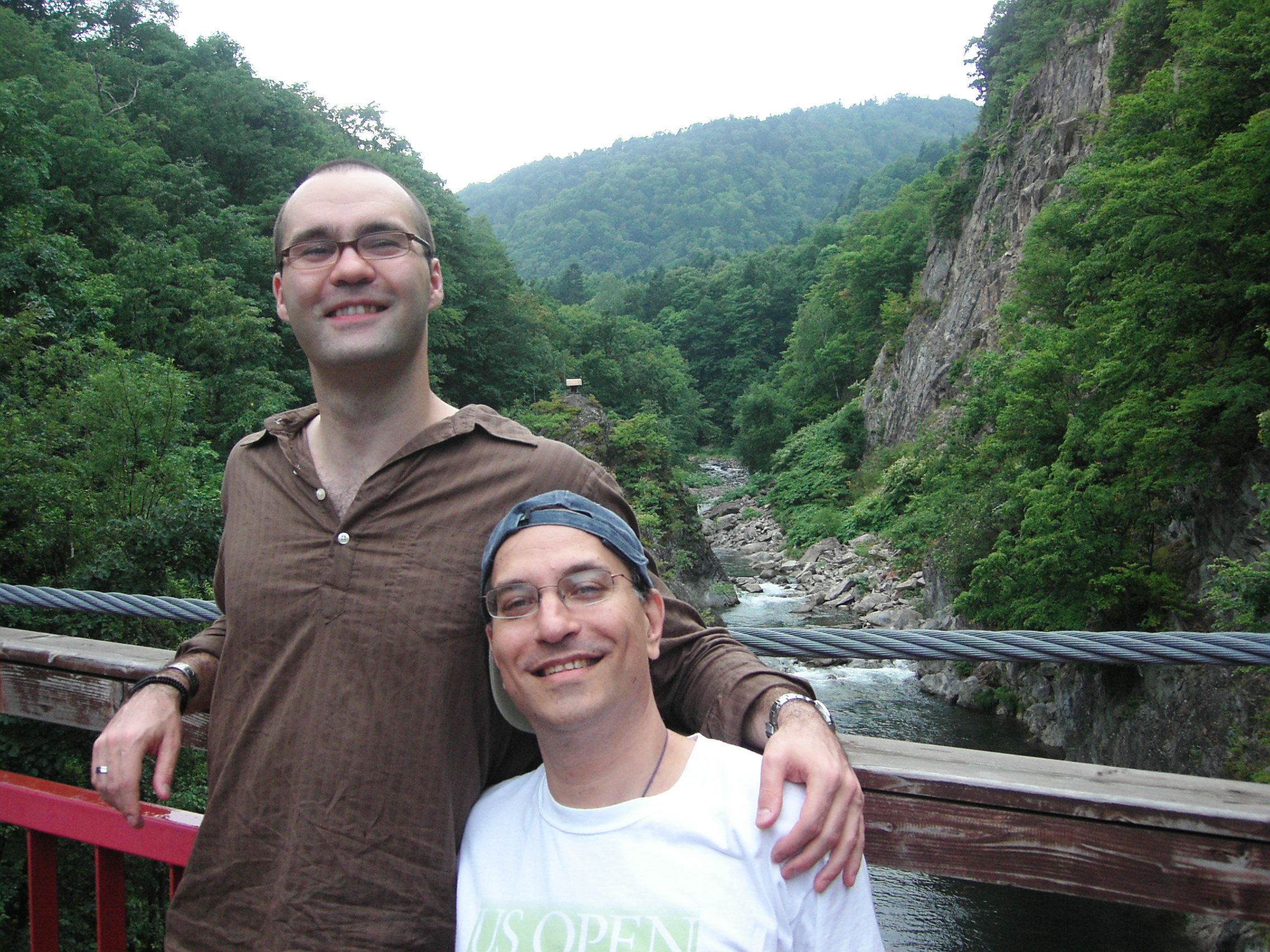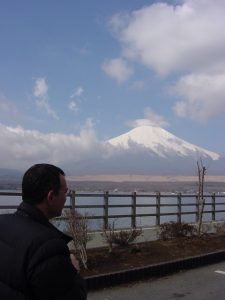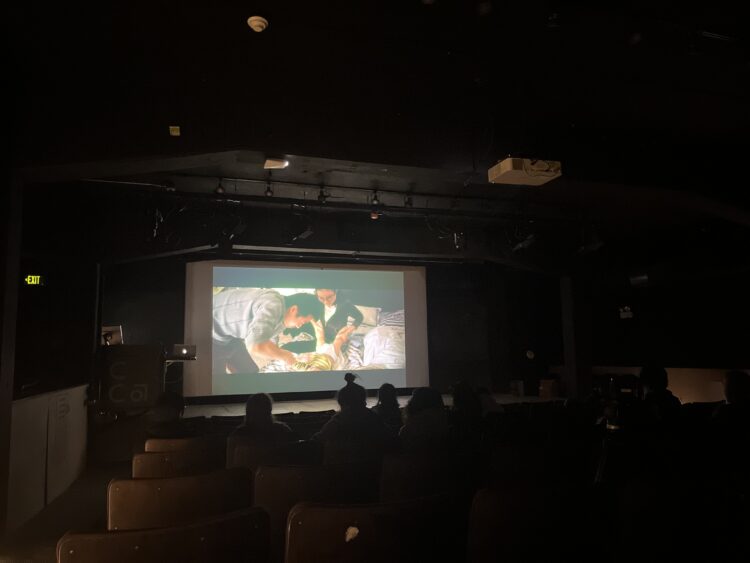Kenny Fries Considers Disability and the Gods in Japan

For Kenny Fries, intersectional identities are second nature: he is disabled, gay and Jewish, not to mention both a poet and a memoirist. And in his recent works he subsumes the identity of a foreigner. In his Creative Capital project, In the Province of the Gods, Kenny travels to Japan to discover how the country views disability, how mortality is portrayed there and what role gods play in all of it. The memoir comes out September 19, 2017, published by University of Wisconsin Press, and he will be traveling all over the country for its promotion. We spoke to Kenny over email about his new book.
Alex Teplitzky: So, my first question is: Why Japan?
Kenny Fries: This might be an unexpected, or perhaps even disappointing, answer. I was having some mobility issues and I wanted to live abroad again before I thought I wouldn’t be able to do so anymore. So, I applied for a bunch of grants to support going abroad and to my great surprise I received the Creative Arts Fellowship from the Japan/US Friendship Commission and the National Endowment for the Arts. Though this seems arbitrary, it turned out to be anything but.
As In the Province of the Gods shows, Japan was the right place at the right time. It changed my life.
Disability is usually thought of as a negative, a pejorative. As you point out, in my work I tend to think otherwise.
Alex: Even if writing about Japan was by chance, there are serendipitous moments in your previous work that seem to foreshadow this new book. In your first memoir, Body, Remember, you see a meteor shower as a chance to connect the natural or divine to disability, when you start naming shooting stars after polio and cerebral palsy. In doing so, you (and the reader) are led to imagine a world where the words for disabilities are not pejorative. The same happens when you learn about disabled gods in the Shinto religion and seek them out in Japan. For an able-bodied reader like myself, these connections feel revolutionary, and I can’t even imagine what it’s like for disabled readers. Can you speak more about some of these moments, and how Japan changed your life?
Kenny: That’s an interesting connection you make. First, you might notice in my work I don’t use the word “able-bodied.” This is for a few reasons, but mostly because, to me, being disabled since birth, disabled is the “norm.” So, I use nondisabled. Disability is usually thought of as a negative, a pejorative. As you point out, in my work I tend to think otherwise. Perhaps this is most notable in The History of My Shoes and the Evolution of Darwin’s Theory, where I present disability as adaptation and variation, using the metaphor of my specially molded orthopedic shoes. Writing that book gave me, and my readers, a new paradigm through which to understand disability.
How did Japan change my life? Answering that is difficult and the glib answer would be the answer is In the Province of the Gods, as the book charts these changes. One of these changes happens early on in the book when I realize that I was treated as different in Japan more because I was a gaijin, a foreigner, than because I was disabled. Overall, Japan provided me with a different take on things that enabled me to move my life forward during a very difficult time.
On a practical level it also changed my life because, during my second stay, I met the man who is now my husband. Writing-wise, it led to a decade of work based on things Japanese, including being commissioned by Houston Grand Opera to write the libretto for The Memory Stone, and In the Gardens of Japan, a poem sequence that became a song cycle, a tenugui (Japanese cloth) designed by a Japanese calligrapher, and now a book published as a companion to In the Province of the Gods.
My writing changed because of my time in Japan and extensive reading of Japanese literature. If you look at my sentences and the way I impart information in Body, Remember and compare it to In the Province of the Gods, I think you’ll see what I mean.
Alex: I love the term nondisabled. I’m going to use that from now on!
You bring up an interesting point which your trip to Japan illuminates in the chapter “Fortune.” Reading it, I was shocked to learn that Buddhism sees disability in terms of reincarnation, that someone must have done something wrong in their past life. It strikes me as a surprisingly misanthropic viewpoint for a religion that’s known for it’s humaneness, and yet in reading it, as a nondisabled person, it sheds light on my own prejudices and backwards-thinking around disability. Were you able to come to terms with this at all?
Kenny: Historically, disability has been looked at vis-à-vis various models, including the religious/moral model. In this way of looking at disability, a disabled person is looked at as either demonic or saintly. Literature is filled with characters who fit this model—Shakespeare’s Richard III (demonic) and Charles Dickens’s Tiny Tim (saintly) are but two examples.
We all look for reasons for things that seem out of order. Religion becomes a way of ordering the world. Buddhism, which deals with past lives, looks to things such as karma, which I think leads to its version of the religious model of disability. I’m not a student or scholar of Buddhism, but living in Japan allowed me, shall we say, an extended secular glimpse into some tenets that affect how disability is looked at. But as we’ve talked about, Japanese culture is also littered with other representations of disability that counteract this.
As a nonbeliever, I don’t think I needed to come to terms with this as much as see how it plays out both in the culture and in the lives of those with disabilities. I was surprised to find as many similarities with the cultural representation of disability in Japan as in the West. For example, the metaphorical equivalence of blindness with knowledge is as strong in ancient Japanese culture as it is in the ancient Greek.

Kenny Fries (right) and his husband, Mike, who he met in Japan.
Alex: Throughout the excerpts that I have read in your In the Province of the Gods, it’s just so clear to me that travel is crucial to expanding one’s vision of any subject, and in spotlighting our own prejudices. Reading your work, it’s obvious that our understanding of disability—but also spirituality and death—at least for Americans, needs to change. But beyond any of these subjects, what was the most surprising thing you found during your time in Japan?
Kenny: It’s interesting you mention death. Mostly, I’ve described the book as about mortality. But for a while I had a short description which was this was my happy book about death. Travel is crucial to my life. It’s not an extra. I realize I’m privileged to be able to travel as much as I have. But I’ve also worked hard to make it so. I can’t imagine what my life would be like if I didn’t spend a year as an undergraduate studying in London and Cambridge. I can’t imagine what my life would be like if I didn’t live twice in Japan. And now I can’t imagine what my life would be like if I didn’t live in Berlin (Stumbling over History, my current work in progress is related to disability in Germany).
Before I left for Japan, I took some Japanese lessons in a class taught by an American who had lived for a time in Japan. He told me that it would be difficult for Japanese to understand my sense of humor, and that it would be difficult to develop deep friendships in Japan. Both of these cautions did not come to pass. I felt understood by the majority of Japanese I met and I did indeed make deep friendships, a few of who found their way into In the Province of the Gods. Perhaps none more than Mika Kimula, the singer with whom I’ve worked on the song cycle from In the Gardens of Japan, the poem sequence just published by Garden Oak Press. (It’s a stunningly designed small book!). And my friendship with Masumi Muramatsu, who was a well-known Japanese simultaneous translator was important in many ways. I hope I’ve done them and our friendships justice in the memoir.
So, perhaps these friendships are the most surprising things I found in Japan. As we’ve talked about, there’s also the new perspectives I found about disability and mortality. But I also found something in myself in Japan that still surprises me, especially when I think about the state I was in when I returned to Japan to live a second time. Serious health issues seemed to make my return to Japan somewhat of a folly, though my doctor encouraged me to go. That Japan turned out to be just the right place to be during this difficult time in my life is still surprising. And, perhaps the biggest surprise of all is I found the man who is now my husband that second time in Japan.
Alex: That reminds me of something you said in your presentation at the Creative Capital Retreat in 2013: “Disability teaches that nothing is constant but change.” You received the Creative Capital award in 2009, 8 years ago now, and I imagine the idea to write about Japan was older than that. So the book has clearly undergone many transformations.
We’re always studying the different ways artists use the award, but I am particularly fascinated by how writers take advantage of it, because without funding, writers are pressured into rushing their work. Writers don’t all work at the same pace, and I’ve heard from other writers who receive Creative Capital Awards that they were grateful that, rather than accelerating their project to completion, it allowed them the time to process their material. It’s not uncommon that writers will publish their work 7 years or more after receiving the award.
Can you speak to the different ways you were able to use the Creative Capital award to make your work stronger?
Kenny: The book sure has gone through many transformations. There were twenty-seven drafts of In the Province of the Gods. (When I tell my students this they are dismayed.) I didn’t discover what the book was actually about until draft twenty-one, or twenty-two, or twenty-three. Early on, thanks to the Creative Capital funding, I was able to take a year off from teaching, and spend time writing at Yaddo, Ledig House, and Chateau de Lavigny. Both In the Province of the Gods and The History of My Shoes and the Evolution of Darwin’s Theory, as well as Stumbling over History, the book I’m now working on, required a lot of research. Research takes time.
Then, with the support of my Creative Capital artist coach, I decided to keep the book from my agent and only showed it to my two readers as I worked on it. I wanted the book to be the book I wanted it to be before I let it out into the world. I’m not sure if I’d do it the same way next time, but for this book it felt the right way to go. All of my books are intimate, but In the Province of the Gods perhaps even more than the others.

Kenny Fries in Japan
Besides the financial and practical support given by Creative Capital, just knowing that the book had this support as I wrote it, and would be supported when it was published, was crucial to keep me going and letting it become what it became. I never felt there was an expectation I had to get it done within a certain timeframe. I did get anxious as my fellow 2009 literature awardees had their projects published. But just as I physically make my way through the world differently than others, my writing process is probably just as different. I also had the Houston Grand Opera commission to write the libretto for The Memory Stone.
Creative Capital lessened the anxiety inherent in the creative process. I guess now it’s time to be anxious all over again with Stumbling over History, for which research is pretty much complete. Writing a first draft is always the most difficult part of writing for me. I’ve had grant support, including a second Fulbright, to do this new work but most grants are hit-and-run. You get the money and that’s that. There isn’t the other support one gets from Creative Capital. The past month, I’ve been sidetracked from the new book by the publication of In the Province of the Gods and In the Gardens of Japan. With a long book tour upcoming, I guess the anxiety about the new book will be left for another day.
To order Kenny Fries new memoir, check out his website.
